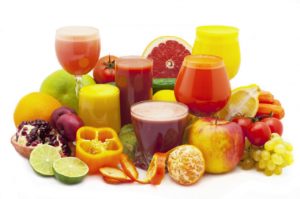There is a lot of buzz these days about juicing. With the showing of popular movies like “Sick, Fat, and Nearly Dead” getting the attention of the masses, and the success of famous people like Jack LaLanne who sold his famous juicer for years before dying at the ripe old age of 96, more and more people want to experience the health benefits of juicing.
What is Juicing?
Juicing is the process of separating pulp and fiber from fruit or vegetables. Usually, you need to use special equipment such as a juicer.
You can also use a high speed blender along with special filtering bags to remove the pulp from the blended fruit or vegetables. There are benefits of both types of juicing but the first kind; pushing it through a juicer, is a lot faster but you may also end up with more waste.
Benefits & Risks of Juicing
Juicing is both loved and hated by medical professionals and nutritionists. You can find as many different opinions on juicing as you can on the big political questions of the day. Like with most things, it’s important that you consider your special health circumstances, talk to your doctor, do your research and make your own decisions about whether or not juicing is something that will help you.
Some of the claimed benefits of juicing are:
* Increased Energy – Due to the high concentration of nutrition in each vitamin packed juice that you make your energy has nowhere to go but up. It would be impossible to get that much nutrition from the whole fruit and vegetable because you would get full first.
* Weight Loss – If you drink juice along with a low-fat and low calorie diet, you can lose weight very fast while still getting a lot of nutrition inside of you.
* Strengthened Immunity – The high nutrition involved with juices that you make at home will make your immune system very strong.
* Cleared Skin – Many people who go on “juice feasts” meaning, they do nothing but ingest juice for 3 to 21 days end a lot of their skin problems. To keep the results it requires careful re-feeding to avoid the food that caused the problem to start with.
* Increases Disease Resistance – Juicing can lower the c – reactive protein found in the blood that is considered to be a marker for higher levels of cancer, stroke and heart disease – juicing lowers that marker.
Some of the potential risks of juicing are:
* Poor Blood Sugar Effects – Using high sugar fruits too often can cause some people to react poorly in terms of blood sugar. Start slowly to see how you will react. If you have diabetes or other blood sugar related conditions talk to your doctor before doing any type of juicing.
* Foodborne Illness – It’s very important to wash your produce very well before juicing it. If you buy juice in the store it is pasteurized which helps prevent foodborne illnesses such as E. coli, salmonella and even hepatitis. When making fresh juice at home or going to a raw juice bar there is a risk if the produce is not washed well.
* Upset Stomach – Sorbitol, a non-digestible sugar found in some fruits can cause diarrhea, gas, and other stomach troubles when eaten in high quantities. While sorbitol can be found in other foods as well, people who are susceptible to it may experience problems when adding too many fruits like prunes, cherries, apples and pears to their juicing regimen.
* Weight Gain – This might be surprising, since so many people lose weight when juicing. However, when some people combine juicing with eating, they gain weight. This is especially true when juicing fruit. Fruit juice is a highly concentrated form of calories and can cause weight gain.
* Carotenemia – This is not dangerous but is the name of the condition given to people who eat too many veggies that contain beta-carotenes and describes the orange skin appearance they often experience.
To experience the benefits and not the risks, check with your doctor before engaging in long-term juice “feasting”, otherwise adding some juice to your day such as for breakfast, lunch or dinner should help you reap the benefits that juicing and the massive addition of nutrition to your day can provide.
More about juicing:
How much juicing is too much?

